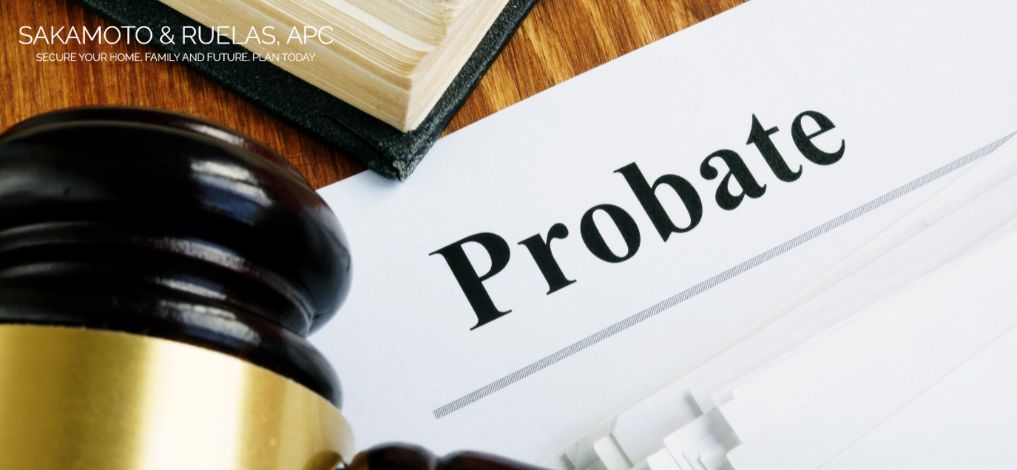Call us today(714) 994-4900
Anaheim Probate Lawyer

Anaheim Probate Attorney
Losing a loved one is already difficult, but it can be especially difficult if you were named the executor of their estate. While serving as an executor provides you with the opportunity to fulfill your loved one’s wishes, it is a substantial responsibility. You do not need to handle your duties as an executor without legal help. Choosing an experienced Anaheim probate lawyer can make the probate process easier for you and your family.
The team at Sakamoto & Ruelas, APC, has many years of experience assisting clients with estate planning, probate, and trust administration. When you need an Anaheim probate law firm, contact them to be the legal support you require.
Understanding the Probate Process
Probate is the legal process that happens when there are assets to be distributed after someone’s death, such as investments, real estate, and bank accounts. Probate can still be initiated with or without a will. Most cases follow these steps to probate a decedent’s estate:
- In most cases, the person who is outlined in the will as an executor hires a lawyer to prepare and file a petition.
- The probate lawyer, or executor, mails notices to everyone named in the will about the death and the probate hearing.
- A hearing will take place several weeks after filing. The purpose of this hearing is to decide if the will is official and to appoint the executor officially.
- The executor must identify and oversee the assets until the remaining debts have been paid and tax returns filed. This process usually takes a year. Depending on the decedent’s potential debts and the terms of the will, the executor may need to sell some property.
- After finalizing the debts and taxes, the executor must file a report with the court that outlines all the income received from selling the property and any payments made on the estate’s behalf. The judge will then allow the executor to divide any property that is remaining among the beneficiaries named in the will.
- The remaining property will then be transferred over to the new owners, and the estate will be closed.
There are many factors that can add to the complexity of this process, such as the size of the estate and any beneficiary disputes. Some assets, such as those held in joint tenancy or in a living trust, may bypass probate altogether and not be considered probate property.
Assets that will be addressed during the probate process are anything the decedent owned before they passed. A living trust can also be used to avoid probate for any assets that could be subject to probate court.
The property is divided into tangible and intangible. Tangible assets can include houses, vehicles, boats, electronics, jewelry, furniture, artwork, and/or household goods. Intangible assets are property the decedent owned that can include stocks, patents, trademarks, copyrights, business interest, and checking or savings accounts.
If the estate is worth $166,250 or less, you could avoid litigation and potentially use a small estate affidavit to get the property transferred over to you. You can start this process 40 days after the person has passed away. Keep in mind that you cannot transfer property, such as land or buildings, using this affidavit. You also cannot use it if there is already a probate case about the person’s estate open.
The Executor’s Role
An executor is commonly named in the will and is appointed to manage the descendant’s estate. If there is no will, that person is appointed by the courts. This person is responsible for:
- Validating the Will – The executor is responsible for presenting the will to the probate court and ensuring its validity, which may involve filing necessary documents and affidavits.
- Managing Assets – The executor will take control of the decedent’s assets, which may include bank accounts, investments, real estate, and personal property.
- Paying Debts and Expenses – The executor is responsible for paying the deceased person’s debts, including funeral expenses, taxes, and other financial obligations.
- Distributing Assets to Beneficiaries – After all of the debts and expenses are settled, the executor will distribute the remaining assets to the beneficiaries according to the terms of the will. If there is no will, the executor will follow California’s intestacy laws.
- Fulfilling Legal Requirements – The executor must comply with legal requirements, including filing necessary documents with the probate court and ensuring that the estate administration follows the law.
The executor’s primary role is to act in the interests of the decedent, which can become complex and time-consuming. It requires attention to detail and a thorough understanding of legal and financial laws.
Testate vs Intestate Probate
In California, “testate” refers to the situation where a person passes away with a valid will, while “intestate” refers to the situation where a person dies without a valid will. When a person dies without a valid will, California law determines the distribution of their estate. The surviving spouse or domestic partner often receives the largest share of the estate, and if there are children, parents, or siblings, they may receive a portion of the estate based on the probate code.
It’s important to note that the intestate probate process can be more complex and time-consuming than if there is a valid will. Since there are no specific instructions from the descendant, this may cause disagreements among their beneficiaries.
Family dynamics can affect the process of settling an estate in Anaheim, CA. The process can take a longer time if family members disagree and inheritance disputes arise. A probate attorney is essential in situations like these because they can manage the conflicts between family members and ensure the law is being followed. A well-crafted estate plan, open communication, and proactive measures all contribute to a smoother process.
Estate Planning
Estate planning is the process of deciding how your assets will be divided and distributed in the event of your death. It also includes how you wish to provide for your loved ones and make decisions about your medical care and financial affairs in the event of incapacitation.
Components of estate planning in California are writing a will, a living trust, granting power of attorney, deciding on health care directives, beneficiary designations, deciding on guardianship for minor children, and estate tax planning. Effective estate planning can help avoid or minimize the need for your family to go through probate court proceedings.
Enlist the Support of an Anaheim Probate Law Firm
At Sakamoto & Ruelas, APC, we have experienced Anaheim probate attorneys here to help you as the executor of your loved one’s estate. We want to make the probate process less daunting and more manageable for you by providing guidance. We are equipped to help families through challenging times while ensuring they are adhering to California family law.
FAQs About Anaheim, CA Probate Laws
How Much Does It Cost to Go Through Probate in Anaheim?
In California, probate attorney fees and executor commissions are determined by the California Probate Code and are based on the gross value of the estate. On top of those fees, there may also be other associated costs, such as probate referee fees and court administration fees.
Do I Need a Lawyer for Probate in Anaheim, CA?
No, you can probate a will without a lawyer, but it is better to have an experienced probate attorney on your side who knows the laws and can help you avoid making mistakes that could cost you. Probate can be a complicated process; and if you’re not familiar with it, you could easily make mistakes, especially while going through the loss of a loved one.
How Can I Help My Family Avoid Probate When I Pass Away?
Wanting to spare your family from probate court is understandable. Here are ways of avoiding probate in California:
- Creating a Living Trust
- Setting up a Joint Ownership
- Payable-on-Death Designations for Bank Accounts
- Transfer-on-Death Registration for Securities
- Transfer-on-Death Deeds for Real Estate
- Transfer-on-Death Registration for Vehicles
Each financial situation is different, so it is recommended that you consult with a probate lawyer.
How Long Does Probate Take in Anaheim, CA?
Probate in Anaheim, CA, can take around nine months up to a year, depending on several factors. These factors include the caseload of the courts, any disputes, and how complex the estate is. Any of these elements can contribute to the length of the case.
What if I Don’t Live in the Same State as My Loved One?
If your loved one resided in California, and you are an out-of-state executor, your probate attorney is able to work with you to ensure the process is handled efficiently and in compliance with California state law.
Contact Our Anaheim Probate Lawyers Today
Navigating the complexities of probate law can be daunting, so an experienced probate attorney at Sakamoto & Ruelas, APC, is instrumental in helping you through all of the details. Contact us today to set up an initial consultation, and we can discuss the details of how we can help you.
Anaheim
Practice Areas
Request a Consultation
Fields Marked With An ” *” Are Required
Sakamoto & Ruelas, APC
Secure Your Home, Family And Future. Plan Today.
Contact Us
Call Our Office At (714) 994-4900

Cerritos Office
Main Office
18115 Valley View Avenue
Suite 201
Cerritos, CA 90703
Phone: (714) 994-4900




